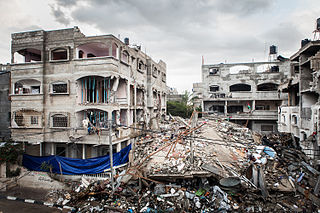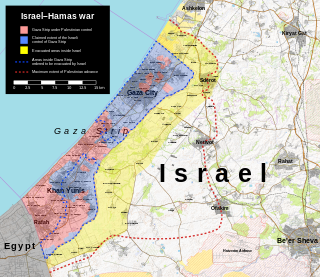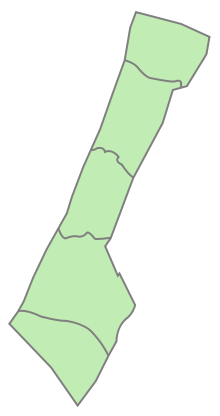
Jabalia Camp is a Palestinian refugee camp established in 1948 by the United Nations to house those displaced by the 1948 Palestinian expulsion. Located 3 kilometers (1.9 mi) north of Jabalia in the Gaza Strip, it is the largest refugee camp in Palestinian territory, with more than 100,000 inhabitants. Due to Israeli attacks during the Israel–Hamas war, the refugee camp was described as "destroyed".
Al-Shifa Hospital was the largest medical complex and central hospital in the Gaza Strip, located in the neighborhood of northern Rimal in Gaza City.

The 2010 Gaza clashes were military clashes in the Gaza Strip between Israeli forces and Palestinian armed groups that occurred in March 2010.

The 2014 Gaza War, also known as Operation Protective Edge, and Battle of the Withered Grain, was a military operation launched by Israel on 8 July 2014 in the Gaza Strip, a Palestinian territory that has been governed by Hamas since 2007. Following the kidnapping and murder of three Israeli teenagers in the West Bank by Hamas-affiliated Palestinian militants, the Israel Defense Forces (IDF) initiated Operation Brother's Keeper, in which it killed 10 Palestinians, injured 130 and imprisoned more than 600. Hamas reportedly did not retaliate but resumed rocket attacks on Israel more than two weeks later, following the killing of one of its militants by an Israeli airstrike on 29 June. This escalation triggered a seven-week-long conflict between the two sides, one of the deadliest outbreaks of open conflict between Israel and the Palestinians in decades. The war resulted in over two thousand deaths, the vast majority of which were Gazan Palestinians. This includes a total of six Israeli civilians who were killed as a result of the conflict.
The year 2023 in Israel was defined first by wide-scale protests against a proposed judicial reform, and then by the Hamas-led attack on Israel on October 7, which led to a war and to Israel invading the Gaza Strip.
Events in the year 2023 in Palestine.

An armed conflict between Israel and Hamas-led Palestinian militant groups has been taking place in the Gaza Strip and Israel since 7 October 2023. It is the fifth war since 2008 in the Gaza–Israel conflict, and the most significant military engagement in the region since the Yom Kippur War in 1973. The first day of the war was the deadliest for Israel, and it is the deadliest war for Palestinians in the history of the conflict, sparking an ongoing Middle Eastern crisis.

The Israeli invasion of the Gaza Strip is a major part of the Israel–Hamas war. Starting on 7 October 2023, immediately after the Hamas-led attacks on Israel, it began bombing the Gaza Strip; on 13 October, Israel began ground operations in Gaza, and on 27 October, a full-scale invasion was launched. Israel's campaign has four stated goals: to destroy Hamas, to free the hostages, to ensure Gaza no longer poses a threat to Israel, and to return displaced residents of Northern Israel. After more than a year of the invasion, fighting in the Gaza Strip was halted with the implementation of a ceasefire between Israel and Hamas on 19 January 2025.

Since the start of the Israel–Hamas war on 7 October 2023, the UN Human Rights Council has identified "clear evidence" of war crimes by both Hamas and the Israel Defense Forces. A UN Commission to the Israel–Palestine conflict stated that there is "clear evidence that war crimes may have been committed in the latest explosion of violence in Israel and Gaza, and all those who have violated international law and targeted civilians must be held accountable." On 27 October, a spokesperson for the OHCHR called for an independent court to review potential war crimes committed by both sides.
The killing of journalists in the Israel–Hamas war, along with other acts of violence against journalists, marks the deadliest period for journalists in the Israeli–Palestinian conflict since 1992 and the deadliest conflict for journalists in the 21st century. As of September 2024, the Committee to Protect Journalists (CPJ) counted 116 journalists who were killed, and the International Federation of Journalists counted 166 journalists and media workers who were killed. A July 2024 count by the Gaza government media office placed the number of Palestinian journalists killed at 160, and in January 2025 the Gaza Government Media Office increased it to 202.
The siege of Gaza City was an engagement of the Israel–Hamas war that began on 2 November 2023, when the Israel Defense Forces (IDF) surrounded Gaza City, amid the Israeli invasion of the Gaza Strip, which was a counterattack to the 2023 Hamas-led attack on Israel. Gaza City is the most populated city in the Gaza Strip and the battle started on 30 October 2023, when Israel and Hamas clashed in Gaza City. According to Oxfam, about 500,000 Palestinians, along with 200 Israelis and other captives, were trapped in a "siege within a siege" in northern Gaza.

Al-Shifa Hospital, the largest medical complex in Gaza, was placed under siege by Israel in mid-November 2023 during the Israel–Hamas war, after saying it had contained a Hamas command and control center beneath it. The incident was followed by a second major raid by Israeli forces in March 2024.

A significant number of attacks on healthcare facilities occurred during the Israel–Hamas war. During the first week of the war, there were 94 attacks on health care facilities in Israel and Gaza, killing 29 healthcare workers and injuring 24. The attacks on healthcare facilities contributed to a severe humanitarian crisis in Gaza. By 30 November, the World Health Organization documented 427 attacks on healthcare in the West Bank and Gaza Strip, resulting in 566 fatalities and 758 injuries. By February 2024, it was reported that "every hospital in Gaza is either damaged, destroyed, or out of service due to lack of fuel." By April, WHO had verified 906 attacks on healthcare in Gaza, the West Bank, Israel, and Lebanon. As of June 2024, according to WHO, Israel has attacked 464 health care facilities, killed 727 health care workers, injured 933 health care workers, and damaged or destroyed 113 ambulances
Hamas has been accused of using human shields in the Gaza Strip, purposely attempting to shield itself from Israeli attacks by storing weapons in civilian infrastructure, launching rockets from residential areas, and telling residents to ignore Israeli warnings to flee. Israel has accused Hamas of maintaining command and control bunkers and tunnel infrastructure below hospitals, with some of the accusations being supported by the United States, the European Union, and the United Nations Secretary General. Hamas has denied using civilians and civilian infrastructure, including hospitals, as human shields.
Al-Shifa Hospital is a government-run hospital in Gaza City, Palestine; most of the staff are employees of the Palestinian Authority in the West Bank. During the Israel–Hamas war, Israel and the United States stated that several complexes existed under Al-Shifa Hospital, which was being used by Hamas as its "main operations base," a claim that Hamas and hospital administrators denied. Following Israel's release of video evidence of Hamas tunnels under the hospital on 22 November, multiple news agencies concluded that the evidence did not demonstrate the use by Hamas of a command center. Amnesty International said on 23 November 2023 that "Amnesty International has so far not seen any credible evidence to support Israel’s claim that al-Shifa is housing a military command centre" and that "the Israeli military has so far failed to provide credible evidence" for the allegation. Izzat al-Risheq, a Hamas official, denied that the group used the hospital as a shield for its underground military structures, saying there was no truth to the claims. A later report in February 2024 by the New York Times, confirmed the earlier reports but also cited classified Israeli intelligence material suggesting that Hamas did use the hospital as cover.

The insurgency in the northern Gaza Strip was an armed conflict centered in the North Gaza Governorate, beginning after Israel announced it had dismantled 12 Al-Qassam Brigades battalions on 7 January 2024, as part of the Israel–Hamas war.
In March 2024, during the Israel–Hamas war, civilians seeking humanitarian aid were attacked at the Kuwait Roundabout near Gaza City, causing mass killings. According to the Gaza's Health Ministry, 21 Gazans were killed and 155 were wounded. Al Jazeera and Euro-Med Monitor reported eyewitness testimonies, including from Mohammed Ghurab, the director of emergency services at Al-Shifa Hospital, saying Israeli forces were responsible.
Brigadier General Fayeq Al-Mabhouh was the Director-General of Central Operations in the Ministry of the Interior and National Security in the Gaza Strip. He was the leader of their crisis management team. His most notable recent responsibilities related to civilian disaster management, such as coordination and enforcement of restrictions during the COVID-19 pandemic.

Ismail Al-Ghoul was a Palestinian journalist and an Al Jazeera Arabic correspondent in the Gaza Strip.











